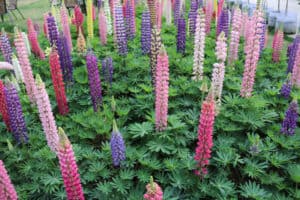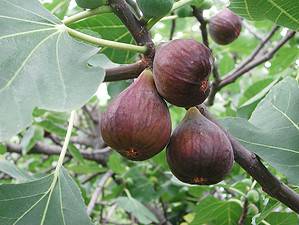You know which vegetables pair together in your favorite dishes, but did you know that some vegetable plants pair well together in the garden? Just like humans, plants have their preferences and if not paired correctly, it could spell trouble for your garden. Learn more about companion planting and discover which vegetables grow well together! Plus, learn which veggies to plant far away from one another!
What is Companion Planting?
Companion planting allows you to use the available space in your garden in the most efficient manner. Not all plants grow well together, and they may even get competitive, inhibiting one another’s ability to grow. Without planning ahead and understanding which plants thrive together, you may mistakenly place plants in a difficult position, which could be detrimental to your garden and ultimately, your harvest.
When companion planting, you are placing plants together that mutually benefit each other. One veggie may enrich the soil for another veggie, or one may grow taller and bushier, offering shade to its garden friend. Some plants, when placed together, protect one another from pests, and sometimes, their pairing makes for a much more delicious flavor experience. If you’re starting a garden, make learning about companion planting a top priority so you can plan for a high yield!
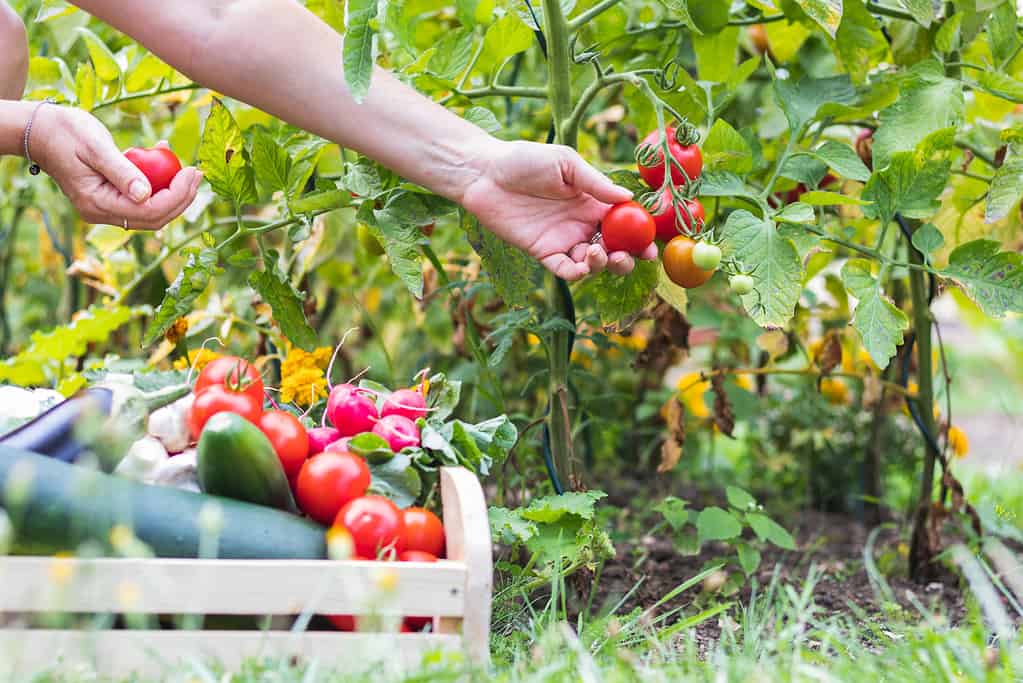
Outdoor organic vegetable gardens make for a great harvest but you must plant mindfully.
©iStock.com/Zbynek Pospisil
Just as there are mutually beneficial pairings, there are also some vegetable plant pairings you should avoid. Whereas companion plants work as a team to help each other thrive, some plants immediately start competing for nutrients and water, inhibiting the growth of one another. Other plants are susceptible to the same diseases and if one gets sick, they both end up in a pickle.
| Companion Planting | Benefits | Don’t Plant Together | Problems |
|---|---|---|---|
| Cabbage and spinach | Roots are at different levels, they don’t compete for nutrients | Corn and tomatoes | Attract same pests and prone to fungus |
| Carrots and tomatoes | Tomatoes provide shade and carrots make tomatoes more flavorful | Cabbage and peppers | Cabbage inhibits the growth of peppers |
| Corn and Cucumber | Corn provides shade and enriches the soil | Zucchini and potatoes | Potatoes inhibit the growth of zucchini |
| Eggplants and Peppers | Same nutrient requirements and they share well | Summer squash and pumpkin | They compete for space |
| Potatoes and Peas | Peas provide shade for potatoes | Parsnip and carrot | Prone to developing the same issues |
| Radishes and leaf lettuce | Quick one-month to harvest | Broccoli and asparagus | Constantly competing for nutrients |
Discover Which Vegetables Grow Well Together
Cabbage and Spinach
With cabbage and spinach, you don’t need to worry about them competing with each other for nutrients. Their roots are at different layers in the soil. Cabbage belongs to the Brassicaceae family, which also includes turnips, kale, broccoli, and others. Any of these do well with spinach, especially if they’re planted in an open space.
Members of the Brassica genus help keep weeds down to a minimum. It is recommended not to plant them too close to each other, however. Cabbage leaves shadow the spinach and may prevent the sun rays from reaching it, which would not allow it to flourish. So long as these plants are spaced apart when planting (18 to 24 inches), you can have yummy veggies that thrive well together!
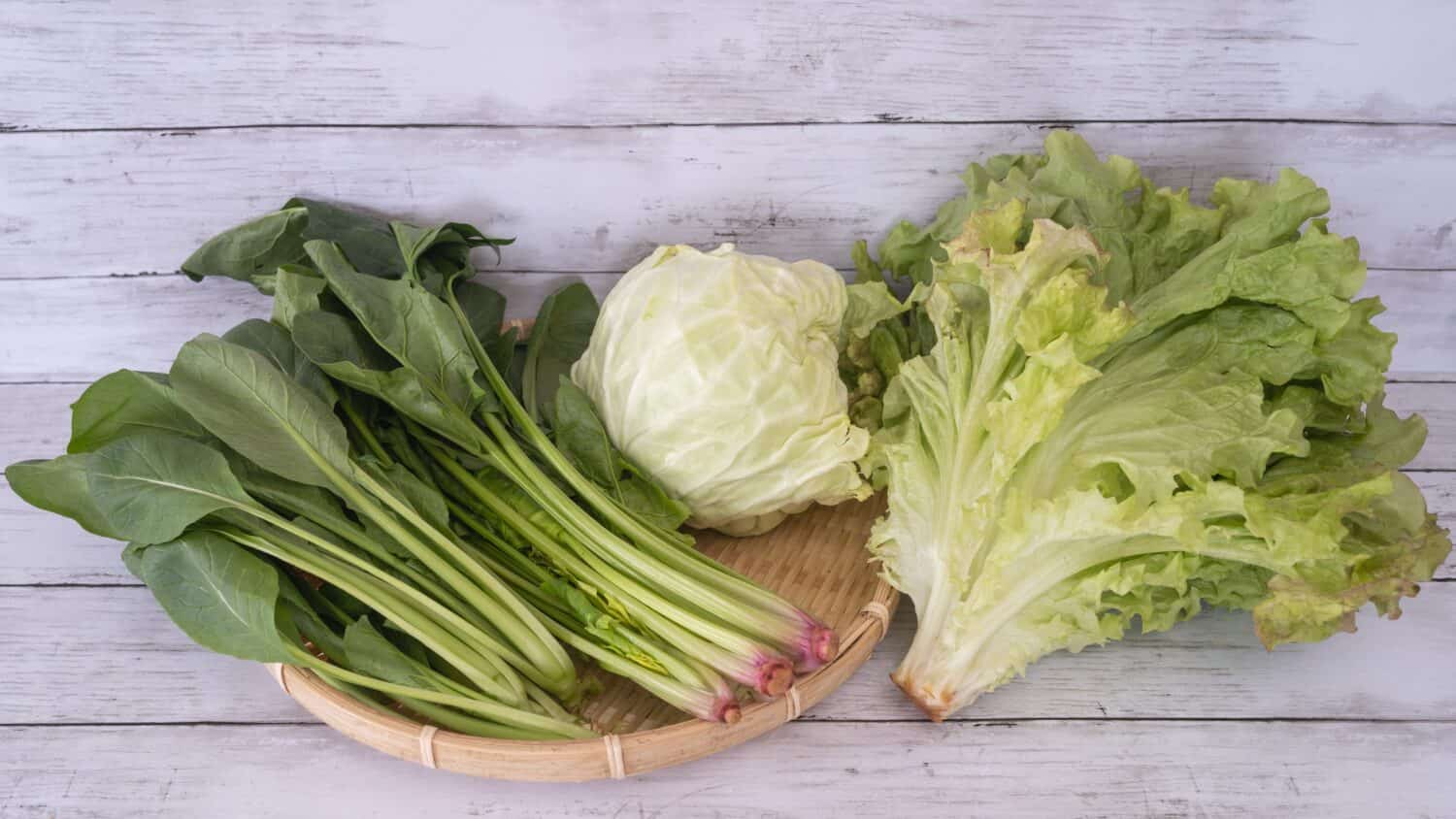
Cabbage pairs well with spinach in a garden.
©aomas/Shutterstock.com
Carrots and Tomatoes
A veggie and (technically) a fruit that pairs well together in many dishes! These two make a great combination as the tomato plant can produce a shade for the carrot’s sensitivity to heat. In return, the carrots improve the tomato’s flavor. You must space them well enough, however, so that they can both fully benefit from one another.
Corn and Cucumber
By planting corn, you provide much-needed shade and nutrients for the cucumbers. When the sun gets too hot, cucumbers struggle but with shade from a neighbor, they can thrive. Corn enriches the soil with nitrogen as well, which cucumbers soak right up. As corn stalks grow, they provide climbing cucumbers with a great support system. The vines hug the stalks as they rise, which makes for a great display as they continue growing suspended in mid-air.
Eggplant and Peppers
Peppers belong to the nightshade family, which includes other veggies like potatoes and eggplants. They make a great companion to the eggplant as they share the same nutrient requirements to grow and stay healthy. The eggplant is somewhat demanding and may falter if the soil does not provide enough for its needs. It needs a lot of sunlight and plenty of water, and peppers help control soil infection. You don’t have to settle on a specific type of pepper, either. Whether you’re looking for a sweeter variety or ready to add some spice to your life, any type of pepper works with eggplant!
Potatoes and Peas
Peas and potatoes are a classic pairing! But be mindful when planting. It is an excellent idea to plant peas before the potatoes as the nitrogen they produce is highly beneficial for the potatoes. Studies have shown that the yield you can get by intercropping is much higher. The peas provide shade to the soil, and the potatoes benefit from it as they retain life-giving moisture.
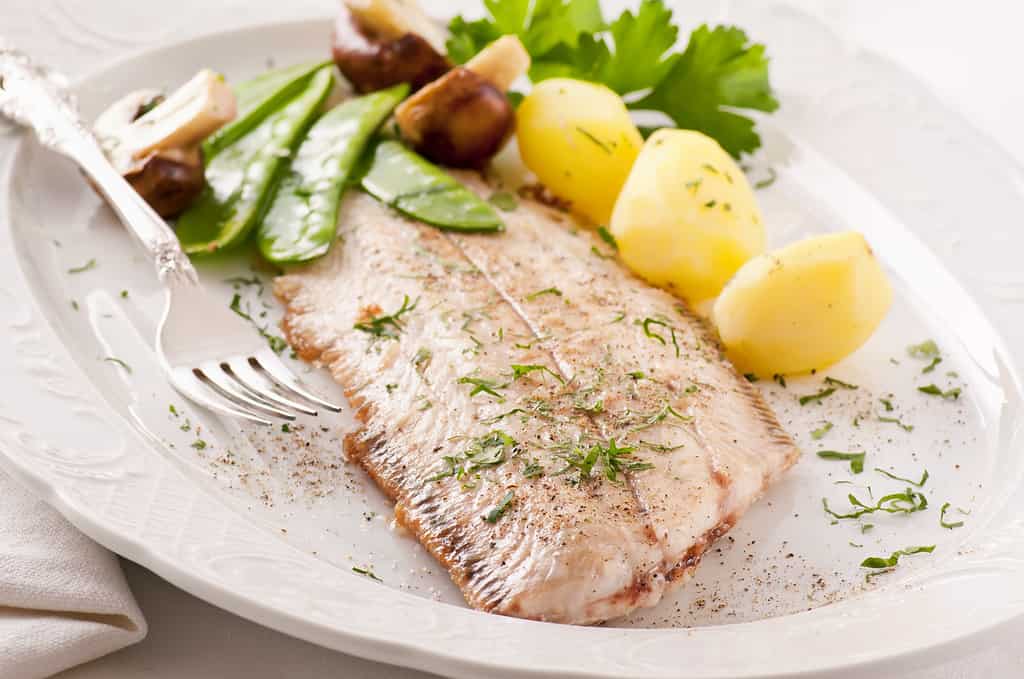
Peas and potatoes complement one another on the plate and in your garden.
©hlphoto/Shutterstock.com
Radishes and Leaf Lettuce
Radishes are a great low-maintenance addition to any garden and add a crunch and spicy flavor to a variety of cold and hot dishes. When you plant radishes and leaf lettuce together, you maximize the space these plants have to thrive in. They are both ready to harvest in about a month, which means you can have your own home-grown salads in no time at all. Use the soil for another harvest or consider planting a different kind of vegetable plant.
Discover Vegetables That Don’t Grow Well Together
Corn and Tomatoes
You’ve discovered vegetables that grow well together but here is a pair that doesn’t jibe in soil. They may work well together in salsa but not in your garden. Both of them are magnets for worms and fungus and if one gets infected, the other goes down with it.
Cabbage and Peppers
Brassica and nightshade family members are not a good match in your garden. Those of the Brassica genus, like cabbage, don’t allow the full growth of nightshade plants like peppers.
Zucchini and Potatoes
These hearty vegetables grow quickly, which makes for a great harvest. But when you plant these together, the potatoes inhibit the growth of zucchini. Potatoes ravish the soil, eating up all the nutrients, which renders zucchini unable to reach its full potential.
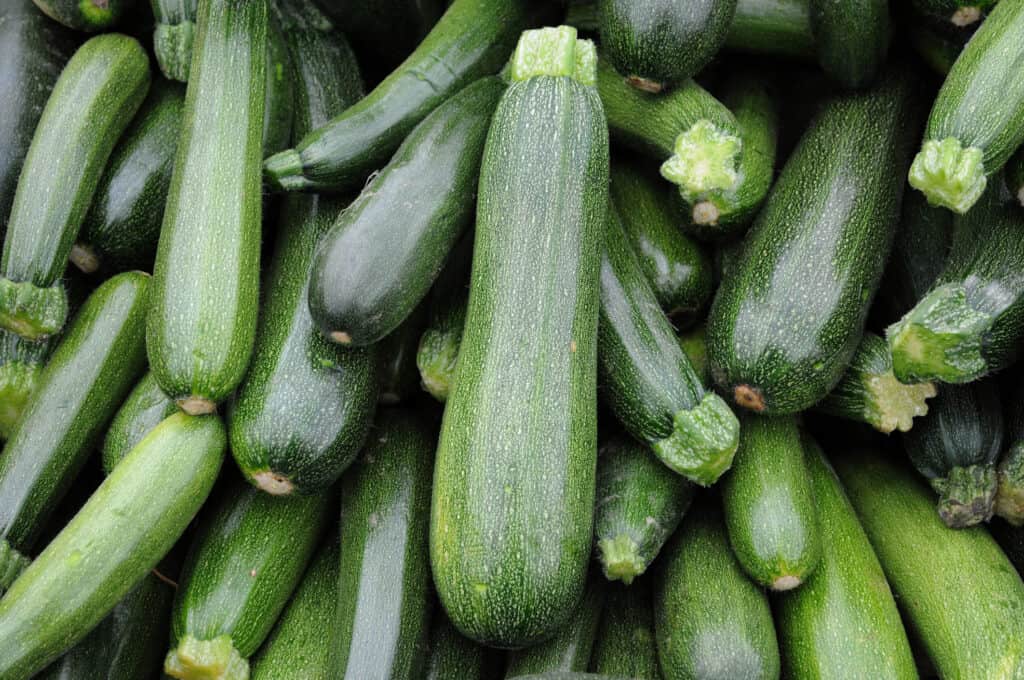
Zucchini needs space to grow and potatoes hog up the available nutrients.
©iStock.com/Pack-Shot
Summer Squash and Pumpkin
Summer squash and pumpkin need lots of space to flourish. If planted together, they struggle and compete for the available space. Both of these are members of the Curcurbita genus. It’s also important to know that they can cross-pollinate, which means both can produce male and female flowers. When you plant these together, you may just end up with a rather awkward hybrid.
Parsnip and Carrot
Kind of like corn and tomatoes, parsnips and carrots are prone to developing some of the same issues. They attract the same types of pests and diseases, which makes it a complete disaster if both plants succumb to an infestation.
Broccoli and Asparagus
Both broccoli and asparagus have voracious appetites. They’re like two teenage boys having to share space and the same plate of food. It’s just not ideal. When planted together, they eat up the nutrients the other needs, which ends up inhibiting their growth. Plus, this keeps them in a constant state of competition instead of focusing on flourishing.
The photo featured at the top of this post is © Valentina_G/Shutterstock.com
Thank you for reading! Have some feedback for us? Contact the AZ Animals editorial team.



